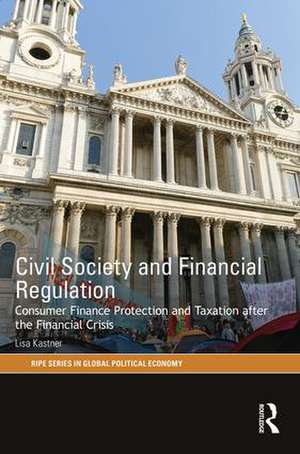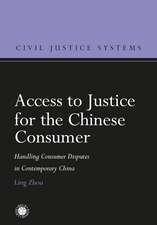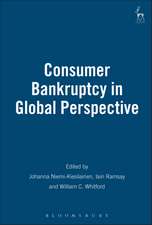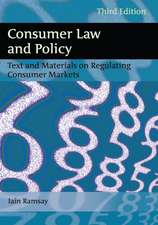Civil Society and Financial Regulation: Consumer Finance Protection and Taxation after the Financial Crisis: RIPE Series in Global Political Economy
Autor Lisa Kastneren Limba Engleză Hardback – 27 oct 2017
Drawing on literature from social movement research and regulatory politics, this book shows how diffuse interests were represented in financial regulatory overhauls in both the United States (US) and the European Union (EU). Four cases of reform in the post-crisis regulatory context are analyzed: the creation of a new Consumer Financial Protection Bureau in the US; the introduction of new consumer protection regulations through EU directives; the failure of attempts to introduce a financial transaction tax in the US; and the agreement of 11 EU member states to introduce such a tax. It shows how building coalitions with important elite allies outside and inside government helped traditionally weak interest groups transcend a lack of material resources to influence and shape regulatory policy.
By engaging with a less well-known side of the debate, it explains how business power was curbed and diverse interests translated into financial regulatory policy.
| Toate formatele și edițiile | Preț | Express |
|---|---|---|
| Paperback (1) | 258.91 lei 43-57 zile | |
| Taylor & Francis – 12 dec 2019 | 258.91 lei 43-57 zile | |
| Hardback (1) | 1109.18 lei 43-57 zile | |
| Taylor & Francis – 27 oct 2017 | 1109.18 lei 43-57 zile |
Din seria RIPE Series in Global Political Economy
-
 Preț: 310.75 lei
Preț: 310.75 lei -
 Preț: 280.02 lei
Preț: 280.02 lei -
 Preț: 281.27 lei
Preț: 281.27 lei -
 Preț: 310.01 lei
Preț: 310.01 lei -
 Preț: 390.12 lei
Preț: 390.12 lei -
 Preț: 288.80 lei
Preț: 288.80 lei - 26%
 Preț: 820.21 lei
Preț: 820.21 lei - 18%
 Preț: 700.75 lei
Preț: 700.75 lei -
 Preț: 386.55 lei
Preț: 386.55 lei -
 Preț: 470.90 lei
Preț: 470.90 lei - 18%
 Preț: 999.46 lei
Preț: 999.46 lei - 18%
 Preț: 1054.97 lei
Preț: 1054.97 lei - 18%
 Preț: 1057.40 lei
Preț: 1057.40 lei - 18%
 Preț: 1055.60 lei
Preț: 1055.60 lei - 18%
 Preț: 1053.16 lei
Preț: 1053.16 lei -
 Preț: 362.26 lei
Preț: 362.26 lei -
 Preț: 456.16 lei
Preț: 456.16 lei - 18%
 Preț: 1058.79 lei
Preț: 1058.79 lei - 18%
 Preț: 1057.89 lei
Preț: 1057.89 lei - 26%
 Preț: 822.54 lei
Preț: 822.54 lei -
 Preț: 278.75 lei
Preț: 278.75 lei - 18%
 Preț: 1056.47 lei
Preț: 1056.47 lei - 18%
 Preț: 1057.89 lei
Preț: 1057.89 lei - 18%
 Preț: 1054.89 lei
Preț: 1054.89 lei -
 Preț: 453.96 lei
Preț: 453.96 lei -
 Preț: 411.42 lei
Preț: 411.42 lei -
 Preț: 432.20 lei
Preț: 432.20 lei - 26%
 Preț: 821.53 lei
Preț: 821.53 lei -
 Preț: 487.86 lei
Preț: 487.86 lei -
 Preț: 353.94 lei
Preț: 353.94 lei - 26%
 Preț: 846.78 lei
Preț: 846.78 lei - 26%
 Preț: 766.24 lei
Preț: 766.24 lei - 18%
 Preț: 1058.43 lei
Preț: 1058.43 lei - 15%
 Preț: 427.78 lei
Preț: 427.78 lei - 18%
 Preț: 703.79 lei
Preț: 703.79 lei -
 Preț: 385.44 lei
Preț: 385.44 lei - 18%
 Preț: 700.31 lei
Preț: 700.31 lei - 18%
 Preț: 1004.20 lei
Preț: 1004.20 lei -
 Preț: 465.69 lei
Preț: 465.69 lei - 15%
 Preț: 672.40 lei
Preț: 672.40 lei - 18%
 Preț: 1016.52 lei
Preț: 1016.52 lei - 18%
 Preț: 1115.21 lei
Preț: 1115.21 lei -
 Preț: 485.07 lei
Preț: 485.07 lei
Preț: 1109.18 lei
Preț vechi: 1352.65 lei
-18% Nou
Puncte Express: 1664
Preț estimativ în valută:
212.24€ • 222.16$ • 176.65£
212.24€ • 222.16$ • 176.65£
Carte tipărită la comandă
Livrare economică 31 martie-14 aprilie
Preluare comenzi: 021 569.72.76
Specificații
ISBN-13: 9781138634428
ISBN-10: 1138634425
Pagini: 216
Ilustrații: 6 Line drawings, black and white; 14 Tables, black and white; 6 Illustrations, black and white
Dimensiuni: 156 x 234 x 20 mm
Greutate: 0.45 kg
Ediția:1
Editura: Taylor & Francis
Colecția Routledge
Seria RIPE Series in Global Political Economy
Locul publicării:Oxford, United Kingdom
ISBN-10: 1138634425
Pagini: 216
Ilustrații: 6 Line drawings, black and white; 14 Tables, black and white; 6 Illustrations, black and white
Dimensiuni: 156 x 234 x 20 mm
Greutate: 0.45 kg
Ediția:1
Editura: Taylor & Francis
Colecția Routledge
Seria RIPE Series in Global Political Economy
Locul publicării:Oxford, United Kingdom
Public țintă
PostgraduateCuprins
1. Introduction.PART I A THEORY OF FINANCIAL REGULATORY CHANGE. 2. Towards a Causal Mechanism of Post-Crisis Regulatory Reform Dynamics. PART II THE CASES. 3. Winner-Take-All Politics and Civil Society Groups: The US Consumer Regulator. 4. Policy Compromise and Civil Society Groups in Financial Regulation: EU Consumer Finance Reforms. 5. Civil Society and the Limits of Lobbying: Case Study of the Financial Transaction Tax (FTT) in the US. 6. Civil Society and the Limits of Capture: Case Study of the EU FTT. 7. Conclusions.
Notă biografică
Lisa Kastner is a policy advisor at the Foundation for European Progressive Studies in Brussels and associated research fellow at Sciences Po Paris. Her research on the politics of financial markets in the US and the EU was awarded the Research Award by the Erasmus academic network on Parliamentary Democracy in Europe (PADEMIA) and the Otto Hahn Medal of the Max Planck Society.
Recenzii
"Who would have thought that the financial industry sometimes has to cave in to civil society groups? In her David-against-Goliath account, Kastner does not downplay the lobbying power of the financial sector, but establishes that finance has moved from a back-room expertise to normal politics. A must-read for anybody interested in the politics of financial regulation."—Cornelia Woll, Professor of Political Sciences, Sciences Po, France
Descriere
Analysing four cases of reform in the post-crisis regulatory context, this book shows how building coalitions with important elite allies outside and inside government helped traditionally weak interest groups transcend a lack of material resources to influence and shape regulatory policy.



















